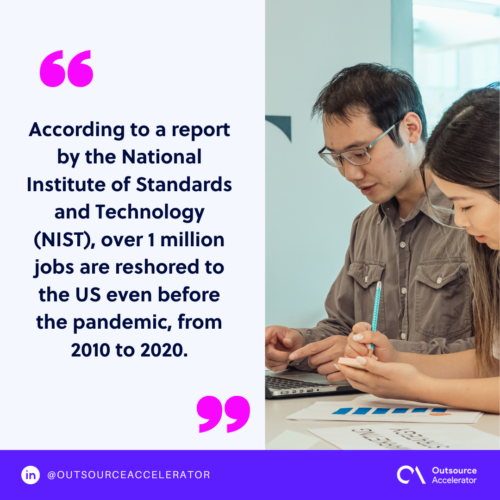Notable reshoring statistics and its impact to businesses in 2024

Reshoring has gained significant attention in recent years. With the temporary halt of global mobility for the past years and the changing global landscape, businesses see this method as an alternative to delegating their operations.
The future of reshoring becomes more optimistic, as shown through recent figures and statistics.
Learn about the notable reshoring statistics and examine its impact on businesses in 2024 in this article.
Reshoring statistics at a glance
Reshoring refers to bringing manufacturing and other business functions back to the domestic market rather than relying on offshore outsourcing.
At one point, offshoring is still highly encouraged to help firms add value to their operations. However, with the rising economic uncertainties and changing customer expectations, more organizations turn to reshoring to secure their operations.
Mentions about reshoring in global firms, especially S&P 500, were up 128% in 2023. It is said to surpass the talks about AI this time!
Governments in developed countries are even supporting this move. Implementing the CHIPS and Science Act in the US is a good example of this, aiming to strengthen the semiconductor industry in the country to match China.

Why businesses reshore their functions
From changing customer preferences to a shift in offshore destination landscapes, businesses are reshoring for various reasons.
Changing customer preferences
One of the key reasons why businesses choose to reshore their operations is changing customer preferences.
Consumers are increasingly seeking products and services that are sustainable, locally sourced, and ethically produced. This has become rampant with the increased support of locally-made products from small businesses during the pandemic.
With reshoring, businesses can align with these evolving customer demands and enhance their brand image.
Changes in offshore destination’s landscape
Another factor contributing to the decision to reshore is the changing landscape of offshore destinations.
Market dynamics, geopolitical factors, and economic shifts can all impact the feasibility and attractiveness of outsourcing to certain countries.
For instance, many US firms decided to reshore their services with the ongoing Russia-Ukraine conflicts. They have also pulled out their operations in China with spiking labor costs and expenses.
Through reshoring, businesses can mitigate the risks associated with offshore operations and have greater control over their supply chains.
Reducing risks
Reshoring also offers businesses the opportunity to reduce risks. Offshore outsourcing comes with challenges, including regulatory complexities and geopolitical issues.
By bringing operations back in-house, businesses can minimize these risks and ensure quality control, intellectual property protection, and faster response times to market demands.
Contributing to economic strength
Reshoring plays a significant role in contributing to the economic strength of a country. By bringing back manufacturing and other functions, businesses create job opportunities, boost domestic production, and encourage innovation in local industries.
This, in turn, stimulates economic growth and strengthens the nation’s overall competitiveness.

Common functions for reshoring
Reshoring encompasses various business functions, but let’s focus on three key areas where it is most commonly observed:
Manufacturing
Manufacturing is the most well-known function when it comes to reshoring. Companies are recognizing the advantages of bringing production back to their home country.
By reshoring manufacturing operations, businesses can improve quality control, reduce lead times, and better oversee the production process.
Additionally, proximity to customers allows for faster response times and customization capabilities.
Support services
Reshoring is not limited to manufacturing. Support services are also being brought back to domestic markets.
Functions like customer service, IT support, and technical assistance are being reshored to ensure better communication, cultural alignment, and higher service levels.
This enables businesses to maintain better control over service quality while delivering localized support.
Supply chain management
As supply chains become more complex and globalized, businesses are increasingly reshoring their supply chain management functions.
By bringing these operations closer to home, businesses gain better visibility, control, and coordination over their suppliers and logistics.
This helps to mitigate risks, reduce lead times, and ensure the smooth flow of goods throughout the supply chain.
Countries involved in reshoring
Reshoring is a global phenomenon, and several countries have been actively bringing back operations to their domestic markets.
Here are four notable countries that have embraced reshoring:
USA
The United States has seen a significant surge in reshoring activities in recent years.
The desire to bring manufacturing back to American soil has been driven by rising labor costs overseas, unpredictable supply chains, and the need to support the local economy.
The USA offers a skilled workforce, advanced infrastructure, and a large consumer market, making it an attractive location for reshoring.
UK
Similar to the USA, the United Kingdom has witnessed a growing trend of reshoring.
Brexit and its impact on trade relations with the European Union have led many UK businesses to reevaluate their offshore outsourcing strategies. Service providers such as BT have notably reshored their customer service to address issues brought up by their clients.
By reshoring operations, companies aim to secure their supply chains, reduce risks associated with cross-border trade, and contribute to the local economy.
Australia
In Australia, reshoring has gained momentum as businesses recognize the value of bringing back manufacturing and support services to the country. More manufacturers are reportedly gearing up to reshore their services in recent years.
The advantages of reshoring in Australia include proximity to the Asia-Pacific region, a skilled labor pool, and access to advanced technologies.
Reshoring allows Australian businesses to meet domestic demand, reduce reliance on overseas suppliers, and enhance their competitiveness in the global market.
Canada
Canada is slowly embracing reshoring to strengthen its economy and create job opportunities. While demand for it is weaker in the country, the Canadian government sees the machinery sector as its bright spot forward.
The country offers a stable business environment, a highly educated workforce, and a robust infrastructure.
Reshoring statistics that matter in 2024
As we look toward 2024, several reshoring statistics highlight the impact and potential opportunities for businesses:
Over 1 million jobs were reshored in the US from 2010 to 2020.
According to a report by the National Institute of Standards and Technology (NIST), over 1 million jobs are reshored to the US even before the pandemic, from 2010 to 2020.
One of the reasons for reshoring includes lean supply chain management through closer proximity to their target customers.

96% of CEOs surveyed consider reshoring their operations.
Kearney’s Reshoring Index revealed that 96% of CEOs either considered reshoring, have started the process, or have already reshored. This has increased from 78% in 2022.
This high interest reflects the growing recognition of the benefits of reshoring, such as alignment with changing customer preferences.
50% of manufacturing executives find it difficult to fill up job vacancies.
The same Kearney report also revealed that half of the reshored manufacturers still struggle to fill vacancies, even for basic tasks.
This talent shortage highlights the need for companies to invest in training and development programs, as well as practice strategic recruiting, to bridge the skills gap.
Automation is seen as a way for businesses to facilitate reshoring.
Another way to fill talent gaps in reshoring is through automation. This is a good way to establish smart factories in countries where operations are brought back.
Companies can enhance productivity, reduce labor costs, and bring operations back to domestic markets by leveraging advanced technologies.
Automation is crucial in reshoring efforts and ensures competitiveness in the rapidly evolving business landscape.
It “may take a long time” for manufacturers to adjust to reshoring fully.
All in all, experts say it “may take a long time” for manufacturers to adjust to reshoring. Various challenges, including supply chain risks, new infrastructure, and workforce retention, are included in this estimate.
However, the long-term benefits of reshoring make this transition worthwhile.
How reshoring can benefit you
Reshoring offers several advantages, including:
Greater control over quality
Reshoring allows you to maintain better control over the quality of your products or services.
Proximity to production facilities allows for regular monitoring, faster feedback loops, and the ability to address any issues quickly.
Faster response times
Reshoring enables businesses to respond more quickly to customer demands and unforeseen circumstances. Close proximity to the domestic market allows for faster production and delivery.
Support for the local economy
Reshoring contributes to the economic growth of your country by creating jobs and fostering innovation. You can play a role in supporting your community and strengthening your local business ecosystem.
Reshoring is not without its challenges.
But with careful planning, investment in technology, and collaboration with local partners, businesses can successfully navigate this transition and thrive in the reshoring era.







 Independent
Independent




